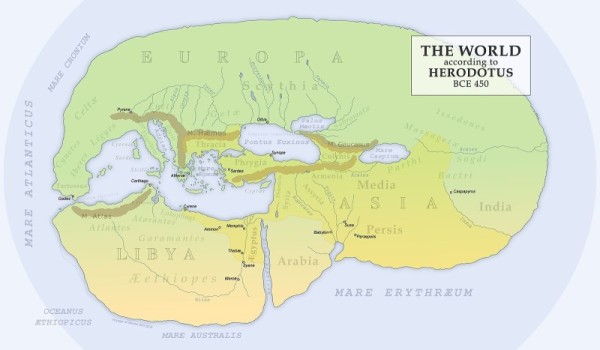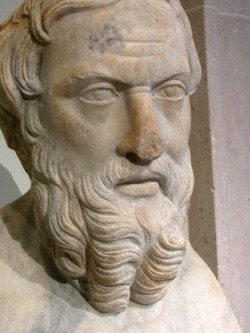Having seen this vision, she used every kind of endeavor to dissuade Polycrates from leaving his land to go to Oroites, and besides that, as he was going to his fifty-oared galley she accompanied his departure with prophetic words . . . .

Translated by George C. Macaulay — our special project presenting the complete Herodotus with URLs for all of those people, places, events, and things which baffles and discourages modern readers.
Previously on Herodotus
123. Polycrates having heard this rejoiced, and was disposed to agree; and as he had a great desire, it seems, for wealth, he first sent Maiandrios the son of Maiandrios, a native of Samos who was his secretary, to see it: this man was the same who not long after these events dedicated all the ornaments of the men’s chamber in the palace of Polycrates, ornaments well worth seeing, as an offering to the temple of Hera. Oroites accordingly, having heard that the person sent to examine might be expected soon to come, did as follows, that is to say, he filled eight chests with stones except a small depth at the very top of each, and laid gold above upon the stones; then he tied up the chests and kept them in readiness. So Maiandrios came and looked at them and brought back word to Polycrates:
124, and he upon that prepared to set out thither, although the diviners and also his friends strongly dissuaded him from it, and in spite moreover of a vision which his daughter had seen in sleep of this kind,—it seemed to her that her father was raised up on high and was bathed by Zeus and anointed by the Sun. Having seen this vision, she used every kind of endeavor to dissuade Polycrates from leaving his land to go to Oroites, and besides that, as he was going to his fifty-oared galley she accompanied his departure with prophetic words: and he threatened her that if he should return safe, she should remain unmarried for long; but she prayed that this might come to pass, for she desired rather, she said, to be unmarried for long than to be an orphan, having lost her father.
125. Polycrates however neglected every counsel and set sail to go to Oroites, taking with him, besides many others of his friends, Demokedes also the son of Calliphon, a man of Croton, who was a physician and practiced his art better than any other man of is time. Then when he arrived at Magnesia, Polycrates was miserably put to death in a manner unworthy both of himself and of his high ambition: for excepting those who become despots of the Syracusans, not one besides of the Hellenic despots is worthy to be compared with Polycrates in magnificence. And when he had killed him in a manner not fit to be told, Oroites impaled his body: and of those who accompanied him, as many as were Samians he released, bidding them be grateful to him that they were free men; but all those of his company who were either allies or servants, he held in the estimation of slaves and kept them. Polycrates then being hung up accomplished wholly the vision of his daughter, for he was bathed by Zeus whenever it rained, and anointed by the Sun, giving forth moisture himself from his body.

CC BY-SA 2.0 image from Wikipedia.
126. To this end came the great prosperity of Polycrates, as Amasis the king of Egypt had foretold to him: but not long afterwards retribution overtook Oroites in his turn for the murder of Polycrates. For after the death of Cambyses and the reign of the Magians Oroites remained at Sardis and did no service to the Persians, when they had been deprived of their empire by the Medes; moreover during this time of disturbance he slew Mitrobates the governor in Daskyleion, who had brought up against him the matter of Polycrates as a reproach; and he slew also Cranaspes the son of Mitrobates, both men of repute among the Persians: and besides other various deeds of insolence, once when a bearer of messages had come to him from Darius, not being pleased with the message which he brought he slew him as he was returning, having set men to lie in wait for him by the way; and having slain him he made away with the bodies both of the man and of his horse.
127. Darius accordingly, when he had come to the throne, was desirous of taking vengeance upon Oroites for all his wrongdoings and especially for the murder of Mitrobates and his son. However he did not think it good to act openly and to send an army against him, since his own affairs were still in a disturbed state and he had only lately come to the throne, while he heard that the strength of Oroites was great, seeing that he had a bodyguard of a thousand Persian spearmen and was in possession of the divisions of Phrygia and Lydia and Ionia. Therefore Darius contrived as follows:—having called together those of the Persians who were of most repute, he said to them: “Persians, which of you all will undertake to perform this matter for me with wisdom, and not by force or with tumult? For where wisdom is wanted, there is no need of force. Which of you, I say, will either bring Oroites alive to me or slay him? For he never yet did any service to the Persians, and on the other hand he has done to them great evil. First he destroyed two of us, Mitrobates and his son; then he slays the men who go to summon him, sent by me, displaying insolence not to be endured. Before therefore he shall accomplish any other evil against the Persians, we must check his course by death.”
– Herodotus, Book III
| <—Previous | Master List | Next—> |
Herodotus made his living by being interesting. In a world where most people did not read and could not afford to buy a book even if they could, they would pay to listen to Herodotus recite from his books. They would not pay to be bored. In that world, the names that populate his stories would have some general familiarity to his audience. Their obscurity to us is a barrier that this series seeks to break down.
MORE INFORMATION
MAP LIBRARY
Because of lack of detail in maps as embedded images, we are providing links instead, enabling readers to view them full screen.

Leave a Reply
You must be logged in to post a comment.